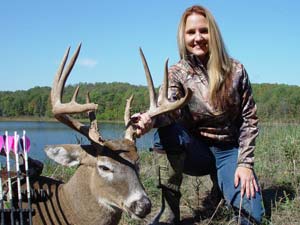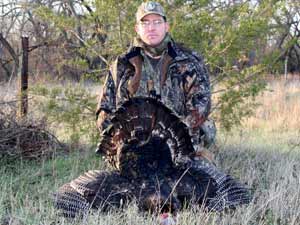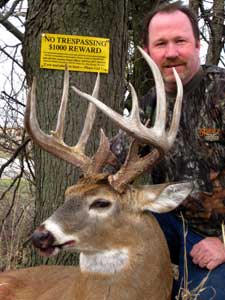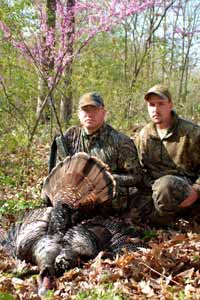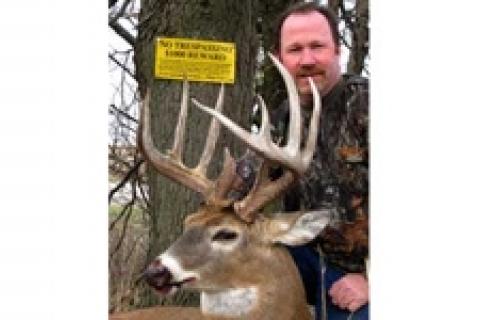
Like it or not, the practice of leasing hunting land is increasing rapidly in the United States. However, you don't need a trust fund or a six-figure salary to get into a hunting lease. You will need to evaluate your needs, hunting styles, time requirements, and the amount you are willing to spend in order to ensure the best fit.
What Types of Hunting Leases are Available?
|
|
| A dandy buck taken on property leased by Wil-Nor Outdoor, a full-service hunt club located Dittmer, Missouri. |
Leases are a lot like stores. Store options typically include mom-and-pop shops, specialty stores, big-box stores and mega warehouse clubs. Similarly, lease options typically include individual arrangements with landowners, hiring an outfitter or joining a hunt club or multi-state hunting service, all of which involve leasing property.
Shopping for a lease is no different than shopping for anything else and an examination of each type of lease may help you decide the option that's best for you.
Individual Properties
Leasing from an individual is similar to shopping at one of the mom-and-pop stores sprinkled across the U.S. The selection may be somewhat limited, often stocking only the necessities, but what they lack in selection they typically make up for in customer service.
Mike Weber has a 210-acre farm in Franklin County, Mo. Several years ago, after pouring money into his farm and getting little in return, he figured he could at least pay his taxes by leasing the hunting rights to his farm. Weber placed an ad in the local paper and soon his phone was ringing off the hook. The applicant list grew, and Weber began the interview process, and he was completely upfront with the potential customers. "I spelled out everything in the contract," says Weber.
Chase Rankin was one of the names on that list. Rankin liked the idea of leasing Weber's farm and was familiar with leasing hunting property. However, Rankin was unsure how often he would be able to hunt the property (he had a new job and the hours that goes with it) and was concerned about footing the entire cost of the lease alone. Weber eased Rankin's mind, suggesting Rankin split the lease with another hunter that had also expressed some interest in leasing his farm.
After Weber discussed the opportunity with both men individually, all three men met. This gave Weber the opportunity to meet both men, while providing the other two men opportunity to see if the venture might work.
Weber guided the two men over the property boundaries. "He wanted to be sure we were physically fit enough to be trusted on his property with no medical surprises," explains Rankin.
At the time, Weber didn't carry insurance in the event that a hunter was injured on his property, but he does now.
The three men hit it off and Rankin and his new hunting partner, James Sutter, began scouting the farm. "Weber was very forthcoming, telling us where he saw the deer cross and where he saw them feed," explains Rankin. "I learned a lot about hunting, not only from Sutter, but from Weber as well. He was a gracious host, and even allowed us to camp on the property if we chose," says Rankin.
"It was a great situation for all of us," recalls Rankin. "If I were hunting in Missouri this season, I'd be leasing Weber's property again." (Rankin was transferred back to Minnesota at the end of 2007.)
Weber realized early on that he was not only in the lease business, but the service business as well. He allowed Rankin to plant food plots on the property, and after the first attempt was washed out, Weber worked the area with his tractor. "I had the tractor out there anyhow, so I just disked it up for him," says Weber.
|
|
| Leasing land from an individual can reap huge rewards like this Nebraska Gobbler. |
Weber's number one rule: "Call and let me know when you're coming out. That way I won't come over and interrupt your hunting, and if something were to happen, I'd know where to look."
Weber found a contract on the internet and changed it to fit his needs. "If the contract was breeched, they would lose their hunting rights and money. It's all in the contract," says Weber.
"Be upfront and read the contract," is Weber's final recommendation for parties seeking similar lease arrangements.
Hunting Outfitters
Specialty stores typically handle one particular item, whether it is shoes, hats or chocolates. Outfitters are like specialty stores, where the hunting offered is usually focused on one or two species.
Kevin Small owns and operates KT's Trophy Hunts. He also leases the 6,500 acres he guides on, which is located in the northeast part of Missouri near Rutledge, home of some of the biggest bucks in Missouri, not to mention fantastic turkey hunting.
Small, who has guided hunters for 11 years, claims he has been leasing properties for hunting since he started guiding. "Leasing land lets farmers utilize the resources they have. The lease income might mean they can take their family on a vacation. Its money they wouldn't have otherwise," explains Small.
Small admits, "Without leasing, I wouldn't have a business. I can't afford to own all of it. For me, leasing is essential to stay in business."
Small realizes that leasing property is taking opportunity away from hunters that knock on doors and ask permission to hunt. "That's a part of the hunting heritage we are going to miss, but it's a thing of the past. In the past 25 or 30 years, farmers haven't had the best run financially, and most farmers need the extra income," Small explains.
Small, who is also a realtor specializing in buying and selling hunting property, claims the average farm he leases is 100 to 200 acres.
Small's contacts as a realtor help him find land to lease.
Most outfitters in this part of the state are booked solid throughout the fall, from the last week of October through the final week of rifle season. "We run non-stop," says Small, "guiding 10 hunters per week over the bow season during the rut, 20 gun hunters the first week of rifle season, and 10 hunters the second week."
What to Expect from an Outfitter
Not only does an outfitter scope out the land and ensure it has game; an outfitter does all the grunt work — scouts, patterns deer, sets up the stands. Yet, before all of this can happen, the outfitter has to lease enough huntable acres to sustain his clients. In addition to all this, an outfitter takes the liability of insurance off of the landowner, as well as carrying insurance for the hunter in case he is injured.
The outfitter also typically feeds the hunter or group of hunters and provides a place to sleep. This is all figured into the fee charged to the hunter for the time spent in camp.
If you are looking for a new area to hunt that has big bucks or turkeys, or just strapped for time and want to maximize the time you do have, perhaps an outfitter is your best bet.
Hunt Clubs
|
|
| A 170 class buck harvested on HSP property, a Multi-State Hunting Service. |
Wal-Mart is the epitome of the general merchandise, big-box store, offering fishing poles, flagpoles and everything in between. Similar to big-box stores, hunt clubs offer a variety of "goods" to its members.
For the hunter who has little time on his hands but is looking to maximize his dollars, the hunt club might be the perfect fit. Most hunt clubs lease several properties so that its members have a wide array of property available to hunt, as well as service at his fingertips.
Many hunt clubs offer services such as game preserves, usually for upland birds. Amenities such as rifle ranges, sporting clays or other shotgun shooting fields are not uncommon, as well as leased properties for hunting big game.
Wil-Nor Outdoors, LLC. located in Dittmer, Mo., is one such hunt club. "Starting as a bird dog training facility, Wil-Nor grew as folks wanted to be able to take their bird dogs out and hunt," owner and head dog trainer of Wil-Nor Bill Kunz explains. "We started leasing local area farms to offer bird hunts, and as we began to grow, we added more services for our members, including leasing deer and turkey properties."
What Does a Hunt Club Bring to the Table?
Kunz explains, "The hunt club does all the work. We do all of the legwork to lease a property and maintain the lease. We establish a relationship with the landowner. We take the hassle out of hunting for the guy who works five, six or even seven days a week so that he has a place to hunt."
"We carry the liability through insurance so both the hunter and the landowner is protected," continues Kunz, "We find that the landowner more readily welcomes a member of a hunt club than he does an individual."
"Leasing is a lot different than it was 20 years ago and a lot more expensive. The liabilities are greater in today's world. Landowners want to know that if something goes wrong, they're covered. All our members sign a hold-harmless agreement to help give the landowner piece of mind," adds Kunz.
What You Get for Your Money?
"We give our members a good place to hunt. The game preserve, dog training and boarding are the real business for us. The hunting part is a service, and several times I've contemplated not doing it anymore, but I enjoy the camaraderie of hunting with the guys, too," claims Kunz.
"Like any service business, we try to make sure each member of the club is happy. When you first join we give you a choice of several available properties. If you aren't happy with a particular piece of property or spot, we will find you a different piece to hunt," says Kunz.
Kunz offers this advice when he is looking for land to lease for hunting purposes.
"First, it has to be affordable and in areas where the game is plentiful — even a chance for a trophy buck." Wil-Nor leases between 8,000 and 10,000 acres in northern and central counties of Missouri. "We maintain most of our properties in that area for that reason," adds Kunz.
What Are Your Hunting Goals?
When a new member joins the hunt club, Kunz asks many questions of them. Have you hunted leased property before? What type of hunting are you accustomed to? What method do you prefer to hunt? Armed with answers, Kunz is able to put the new member on a piece of property that fits his style of hunting and ensures no one will interfere with him and vice versa. "Our hunt club is a bargain if you have the time to use it," he says. "Truth be known, it's probably too cheap if you compare it to other clubs. A 130' to 140' class buck from one of our leases is common," says Kunz.
"We guarantee each hunter 100 acres to hunt. Sometimes we get a piece of ground—say 3,000 acres—but because of the way it lays or so much of it is pasture, we might only be able to get four or five guys on it. When we are looking at a piece of ground, the landowner might tell me he has 500 acres of ground, but we still have to see if there is any huntable ground. If it's only open pasture, it won't be worth as much because we can only get one or two guys on it," explains Kunz.
For the hunter who wants as much as he can get for his hunting dollar, the hunt club proves to be a viable alternative, especially if the hunter hunts more than just deer and turkey. Hunt clubs offer one-stop shopping, and there are many hunt clubs throughout the US.
|
|
| When a hunter is pressed for time, an outfitter can shorten the learning curve to put a hunter on game like this northern Missouri bird taken at KTS Trophy Hunts. |
Multi-State Hunting Services
If other leasing strategies resemble stores, then multi-state hunting services closely resemble Sam's Club and other huge membership warehouse clubs. Buying in bulk — that's the name of the game. Multi-state hunting services lease large amounts of land and provide hunters with the opportunity to use them for a fee. That's why they are in business.
One such multi-state hunting service, Hunting Sports Plus (HSP) located in Blue Springs, Missouri leases in excess of 67,000 acres in the state of Missouri, not to mention the other 120,000 or so acres leased in the neighboring states of Kansas, Iowa and Illinois, as well as, South Dakota, Nebraska and Wisconsin.
What Does a Multi-State Hunting Service Bring to the Table?
"All land that HSP leases is private and the member of the club has the exclusive use of that land for the period of time he wants to use it," says Daryl Traylor, owner of HSP.
Traylor, while researching the start up of his company, found that many clubs offered hunters land to hunt, but when the club members arrived at the property, they found it crawling with other hunters.
"This stems from the club not having enough land for each of its members," Traylor states. "Why pay to be in a hunting club when you have to share the property with strangers? Save your money and go to public hunting areas."
Barth Day of Springfield, Mo., a long time member, claims that HSP gives the members the ability to hunt all private land, in seven different states for the same price as a single lease in Missouri. "HSP gives me more bang for my buck," states Day.
What Do I Get for My Money?
"Each farm is analyzed for both usage and success. If it doesn't meet with the criteria set for HSP, it is culled," explains Traylor. "Each property must provide a successful experience, and HSP's definition of a successful experience is that a member sees the game he or she is pursuing."
Traylor claims that the properties that HSP leases have a 70 percent success rate. Again, they do not guarantee the hunter will harvest an animal, only that they have the opportunity to harvest one.
Aside from the obvious, the vast amount of private land to hunt, lease brokers provide members with the tools to be successful on their hunts. For HSP, these tools are in the form of up to date harvest reports. This report is completed by the member and lets other members know what to expect if they go to this property.
"HSP requires hunters who hunt any piece of land to submit a harvest report within two days of using a property. These reports serve a twofold purpose. They let the office know what was taken from the property and it also lets other members know what other game was observed on the property," says Traylor.
"If a quail hunter flushes four coveys of quail and gets eight of them on a two day hunt, we want to know that. But if that same quail hunter saw 20 deer, a couple turkey and other game, we want to know about that, too," adds Traylor.
"Being accurate is one of the most important aspects of the harvest reports," Taylor explains. "We don't expect anyone to tell us they saw a monster buck on a property. We don't need to know that. We just want to know if they saw deer."
Other tools many multi-state hunting services utilize are reservation systems, as well as aerial photos and topographical maps.
If the idea of having limitless amounts of private land to hunt is your idea of paradise, then perhaps the services of a multi-state hunting service is right up your alley.
The Bottom Line
Leases aren't free, but the expense may be worth the investment to hunters looking for new places to hunt. Armed with the information above, research the lease options in your area to find out the best fit for your needs. Rest assured, once you make the leap of using leased land, disappointment will come in a different form — like missing a big buck!
- 31046 views


